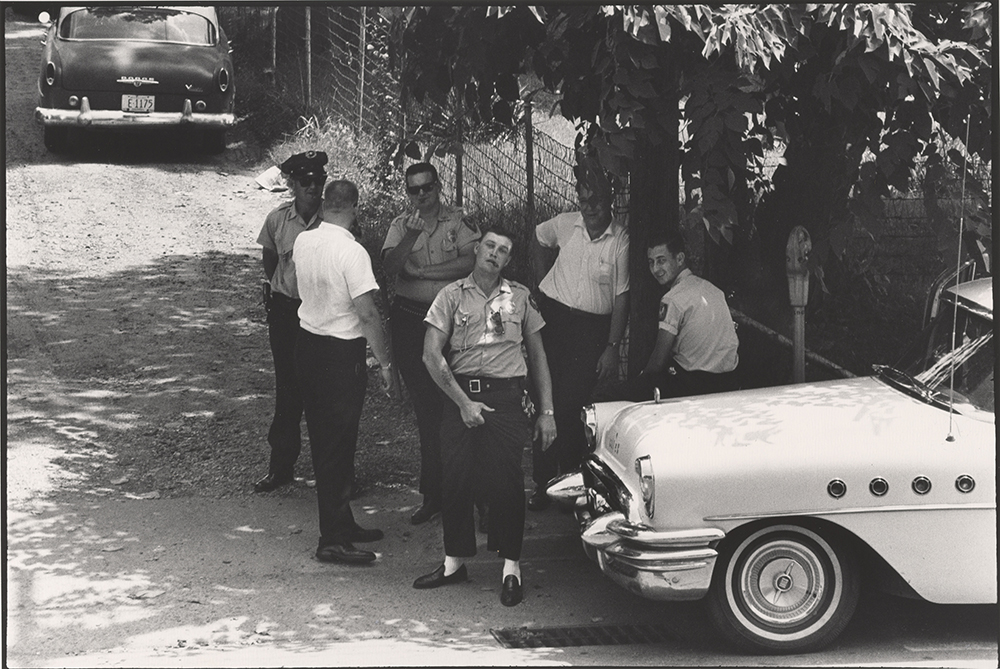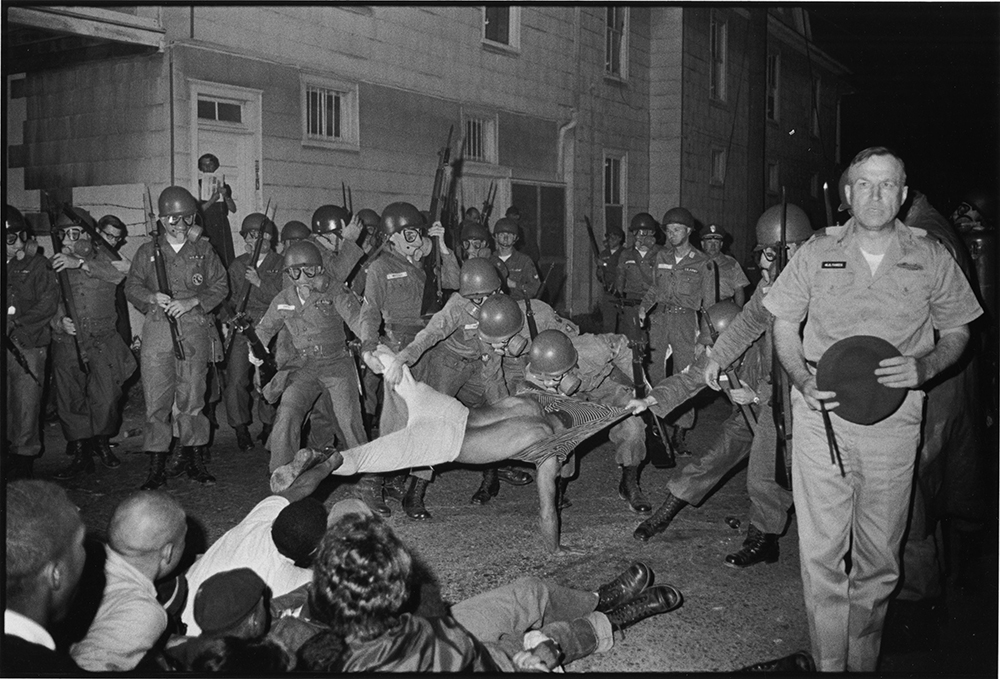DANNY LYON
OUR POLICE – WHICH SIDE ARE THEY ON?

Clarksdale, Mississippi Police Force, 1964
There is something very attractive about police. The handsome guardian, a Glock at his side, a radio on his belt, perhaps a flashlight clipped to his back, a regular Batman ready to protect us. When the 2004 RNC nomination of Bush and Cheney was about to take place in Manhattan, they brought 10,000 members of the NYPD into town. At the time it was larger than many standing armies. Many New Yorkers left town, as they expected violence from the coming demonstrations. Using my NYPD press pass, affectionately called “The Shield”, I filmed for the next five days assisted by my daughter, Rebecca Lyon. A sergeant gave me his card. “If you get arrested, just call me.” A NYPD press pass is like Dumbo’s magic feather. It lets you step across police barriers, stand where you will and get up close to events that they try to keep the public away from. It’s empowering. I have worked in the field, usually with press credentials for over fifty-five years. I have been clubbed unconscious by police. I have been jailed at least three times as a journalist. I have been threatened repeatedly by police at times with their guns and rifles pointed at me.
George Washington formed the first federal police force, the US Marshals. They still exist, their job being to guard federal buildings. One of them put six stitches into my head. The 1967 March on the Pentagon was stopped with extreme police force. Men with clubs and bayonets surrounded the building which the protesters never got near. If you look closely at the news reel footage you can see the first arrest. It’s me! That is my unconscious body being dragged across the plaza by helmeted MPs. The man arrested after me with the homemade American flag is Mark di Suvero.
Seven hundred were arrested trying to reach the building. The following year’s 1968 Democratic Convention in Chicago has correctly been called a police riot. Six hundred demonstrators were arrested. One hundred of them had serious injuries inflicted by the police. Both these protests were highly integrated. During the civil rights movement in the South, protesters usually dreaded the police. I certainly did. We called the FBI the Federal Bureau of Intimidation. When the 1961 Freedom Riders pulled into the bus station in Montgomery, Alabama, the police, who expected trouble, were absent. An enraged mob of one thousand greeted the integrated group of men and women with bats and bricks, practically beating some to death. John Lewis lay in a pool of his own blood when Floyd Mann, head of the the Alabama Highway Patrol appeared over his body, shot his gun into the air and yelled, “They’ll be no killing here today.”

Maryland National Guard arrest Clifford Vaughs of SNCC 1964
I don’t like any authority telling me what to do, especially police. I find it very intimidating to be confronted by an armed policeman. Yet it’s hard to imagine society without police. On January 6th, everyone knew there was going to be a march on the Capitol. Trump said so on live television. But the Capitol was not ringed with police. The mob walked right in.
In 1923 Hitler tried to seize the government of Bavaria with armed men in Munich. His group of Nazis failed because the Munich police fought back, with guns. A dozen or so men were killed. Unfortunately, the Fuhrer was not among them. Hitler emerged from jail after eight months and swore he would never try a putsch again. Hitler wanted to seize power legally. He insisted he had to be legally elected. Hitler also had a private army called the SA. What Trump instigated was not legal. And he has no private army, though some have suggested that that is what ICE is. He also, thank god, has none of Hitler’s many talents. But like Hitler, Trump has lots of very devoted followers, apparently millions of them. Can it happen here? Sure it can. All they need is the police to be on their side and not on ours.
Police are para military forces. Albuquerque, near where I live, has eight separate police forces. That includes Homeland Security, the Railroad Police, the APD, the Bernalillo County Sheriffs and Immigration. There are too many police and they are much too heavily armed. So it’s a quandary. But sometimes we need them. The police failed us miserably yesterday as they handed the Capitol of the American government over to a mob. They didn’t need machine guns to protect the Capitol. They did need the political will to have the building circled by police before the mob we all knew was coming arrived.
In a way, what happens today and in the coming days is more important than what happened on January 6th. Anyone watching television and the net could identify a dozen leaders of the mob. The police could probably identify fifty or a hundred who committed a series of serious federal crimes. Had Hitler been given a five-year sentence in 1923 he would have been finished as a politician. No World War II. No Holocaust. No hundred million dead. The friendly Munich judges gave Adolf Hitler six months and he was held for eight. Just enough time in his resort like cell to write Mein Kampf, a best seller. When he emerged he was a hero of the right and a major player in German politics. As Chancellor he returned each year to Munich to celebrate the failed beer hall putsch that made him famous. What happens now? Does the guy smashing the window with a shield go to prison or get his own TV show? Does the thug in the colorful shirt go to prison or start a company selling designer T-shirts? What about the guy that rappelled down into the Senate chamber? Five years in Leavenworth or a job with REI selling climbing equipment?
The Police are the army of the people. Whose side are they on?
—
Danny Lyon is a photographer, filmmaker, book maker and publisher whose work holds a pivotal place in the postwar American canon. His books THE BIKERIDERS (1968), THE DESTRUCTION OF LOWER MANHATTAN (1969), CONVERSATIONS WITH THE DEAD (1971) and MEMORIES OF THE SOUTHERN CIVIL RIGHTS MOVEMENT (1992) are classics of documentary-based, socially involved art. In 2016 and 2017, the Fine Art Museums of San Francisco and the Whitney Museum of American Art hosted DANNY LYON: MESSAGE TO THE FUTURE, a comprehensive retrospective of his work. AMERICAN BLOOD, comprising almost half a century of Lyon’s uncollected writings, was published by Karma Books in early 2021, and Lyon’s most recent film, SNCC — about the early days of the Student Nonviolent Coordinating Committee and Representative John Lewis, one of the civil rights group’s founders and leaders — was completed in 2020. Lyon was born in Brooklyn, N.Y., and educated at the University of Chicago. He lives in Bernalillo, N.M., and New York City.
